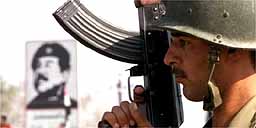|
|
|
The escalation of US military pressure on Iraq is in many ways more worrying for Britain than it is for Saddam Hussein. Every bomb that falls strengthens the Iraqi dictator's claim to pan-Arab leadership in defiance of a supposedly hostile western imperialism. Every long-range cruise or "stand-off" air-launched missile merely emphasises Washington's fear of sustaining casualties or losing hostages in an unwinnable war fought at a safe distance. Saddam knows very well that a large-scale land invasion of Iraq by allied ground troops like that begun and halted in 1991, the only sure way to unseat him, is no longer feasible. How amusing he must find current US talk of funding and infiltrating Iraqi opposition groups more accustomed to sipping coffee in well-appointed London apartments. Every raid increases the discomfort of Saudi Arabia and Kuwait, squirmingly reluctant hosts to the allied planes. Far from reminding Saddam of his enemies' power and resolve, every sortie reminds a watching world of America's bankrupt policy of bombs and sanctions. All of which is deeply worrying, and not just for Britain and the US, many European allies, as well as Russia and China, fiercely oppose the sanctions and bombing policy of the US and Britain. Tony Blair says he acted to defend RAF pilots against an increased threat in the no-fly zones. But, legally speaking, their presence there has no specific UN or other authorisation. Robin Cook says Britain has a humanitarian mission to protect the southern Shia and the Kurds against Saddam's depredations. But this justification relates to the situation 10 years ago. Saddam suppressed the Shia long ago; and the biggest threat to the Kurds is the Turks (and other Kurds). The government has a duty to protect our armed forces. But it has an equal duty not to put them in harm's way unnecessarily. Paradoxically, Britain recently warned the US that the no-fly zone patrols were becoming unacceptably hazardous, even pointless. But instead of taking the rational course and ending them, George Bush decided to use new, secretly agreed rules of engagement to expand them. The resulting, highly escalatory attacks on targets near Baghdad cannot be supported as a matter of law or common sense. They do absolutely nothing to help end Saddam's undoubtedly dangerous tyranny. They diminish the chances that imminent UN talks with Iraq on a resumption of weapons inspections will succeed. They will do nothing to curb the rampant oil smuggling upon which Saddam is once again growing strong. They undermine the US secretary of state, Colin Powell, who may have hoped to rally support for less indiscriminately punitive, arms-focused sanctions during his Middle East visit this week. They increase tension and instability in a region already reeling from the Palestinian intifada and Ariel Sharon's triumph in Israel. Oddly, the attacks did not target chemical and biological weapons facilities that the US says Saddam is rebuilding. Since the proliferation of such mass terror weapons is America's principal stated security concern, why were these alleged factories not bombed? That at least would have been understandable. Worrying for Britain, too, is what this irresponsible action says about the insecure, aggressive mindset of the new administration in Washington. In a sense Mr Bush was testing Mr Blair's loyalty, sucking him back into a conflict he has no mandate to fight. When the two men meet for the first time later this week, the president is likely to want more oaths of fealty, seeking British acquiescence in his globally destabilising missile defence plans, for example, in his intention to disengage in the Balkans and in his apparent belief that Nato has a right of veto over the EU's military aspirations. Increasingly, this domineering American security agenda does not serve Britain's interests, nor that of Britain's European partners. This latest episode in Iraq starkly demonstrates that. Seeking to be special friends with Mr Bush is all very well. But not at any price, Mr Blair. This American president is dangerous. . |

